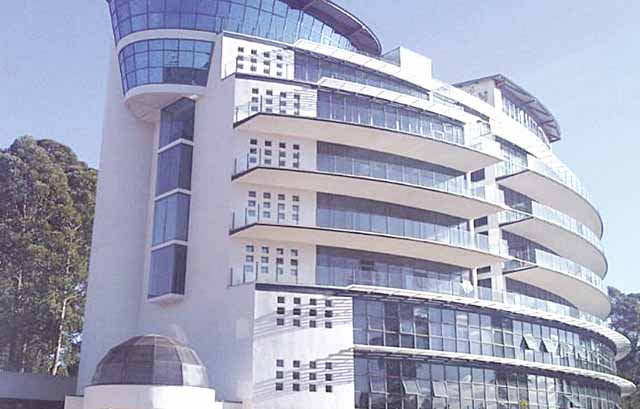By SIBUSISO DLAMINI | 2024-10-01

Public Service Pensions Fund (PSPF) members and stakeholders are feeling their best after an impressive E34.6 billion portfolio was unveiled at its annual stakeholders’ meeting.
The fund’s strategic investments, which generated an impressive 33.7 per cent return on offshore assets, have been met with overwhelming approval, with members lauding how the fund continues to secure the financial future of public servants, while contributing to the country’s economic development.
PSPF presented its latest investment portfolio during the 2024 Stakeholders Meeting on Friday, with figures that highlighted a remarkable increase in returns, driven by prudent asset allocation and favourable market conditions.
The meeting, graced by Minister of Public Service Mabulala Maseko and Principal Secretary Sipho Tsabedze, saw members commend the fund’s leadership and strategic direction. Director of Investments, Musa Hlatjwayo, delivered a comprehensive overview of the PSPF’s financial position, revealing the fund’s staggering E34.6 billion figure as of March 31st.
This figure represents a significant growth from previous years and according to Hlatjwayo, the growth has been fuelled by tactical adjustments in asset allocation, particularly an expansion in offshore investments, which have yielded exceptional returns.
In 2024, the PSPF’s offshore investments surged to an impressive 33.7 per cent, up from 28.5 per cent in 2023. These returns were attributed to the fund’s diverse global holdings and its ability to swiftly adapt to international market trends.
“The year 2024 has been a breakthrough in terms of returns on our investments. We have seen our offshore investments peak at a remarkable 33.7 per cent, demonstrating our ability to capitalise on global market trends,” said Hlatjwayo.
Domestically, the fund’s investments in listed equities and the property sector have also performed strongly. Hlatjwayo noted that local equities delivered a return of 3.2 per cent, despite volatility in the markets, while the property sector remained a cornerstone of the PSPF’s domestic portfolio.
These investments have not only contributed to the fund’s profitability but have also played a key role in driving job creation and infrastructure development within Eswatini.
“Our local investments are not just about returns—they are about making a direct impact on the economic development of Eswatini. By allocating 43 per cent of our assets to domestic markets, we are helping stimulate growth in key sectors,” Hlatjwayo explained.
Over the past few years, the fund has steadily reduced its exposure to South Africa, bringing it in line with Central Bank of Eswatini regulations that cap international investments at 20 per cent.
As of 2024, 34 per cent of the PSPF’s assets were invested in South Africa, with 23 per cent held in offshore markets and 43 per cent allocated domestically.
“Our decision to reduce our South African exposure while growing our offshore assets has paid off tremendously. Offshore markets have consistently delivered higher returns than the local market, and our strategy to expand internationally without neglecting domestic investments has ensured we achieve a healthy balance,” said Hlatjwayo.
He further assured stakeholders that the fund’s leadership remains focused on long-term growth and sustainability. By carefully navigating the complexities of global market fluctuations, the PSPF has established itself as a forward-thinking entity with a robust risk management strategy. challenges “We have laid a strong foundation with our current asset allocations.
While there are always challenges, we are confident in the path we’ve charted for sustained growth,” Hlatjwayo added. Following Hlatjwayo’s presentation, the floor was opened for questions and comments, and members expressed their appreciation for the PSPF’s investment performance.
Swaziland National Association of Teachers (SNAT) President Mbongwa Dlamini commended the fund for transforming the ESASCO building from a ‘white elephant’ into a productive asset, but raised concerns about tenant payment issues at the facility.
“Our reservations lie with the tenants you are targeting. They are not good payers, and this worries us. We hope the fund will look into this,” Dlamini stated.
He also urged the PSPF to intervene in cases where their investments indirectly affect the livelihoods of public servants, referencing Montigny, a key PSPF partner, which he claimed displaced teachers upon acquiring certain schools.
Dlamini expressed concern that such actions could tarnish the reputation of PSPF’s investments. “We ask that you talk to Montigny to ensure that their operations do not negatively impact the people they encounter.
Our investments should improve people’s lives,” he urged. Similarly, Mxolisi Motsa from SNAT raised questions about PSPF’s investment in a high-tech farm in Sidvokodvo. While commending the fund for its financial success, Motsa inquired about the status of this specific project, which he felt had not been adequately addressed.
Pensioners’ representative Thabi Zulu also raised concerns about the deteriorating state of the University of Eswatini (UNESWA), suggesting that PSPF consider investing in the institution’s revitalisation to aid the future generations of Eswatini. desperate “Our children are struggling because of the dilapidated state of UNESWA. Could the PSPF not invest in reviving the university? It is in desperate need of support,” Zulu proposed.
In response to these concerns, PSPF Chief Executive Officer Masotja Vilakati assured members that their feedback would be taken into account. On the issue of ESASCO, he acknowledged the challenge with tenant payments and committed to addressing the situation. Vilakati also clarified that PSPF’s involvement with Montigny and other partners was primarily focused on profitability.
He expressed willingness to engage with these entities to ensure that their actions align with the PSPF’s ethos of improving lives while generating returns. Regarding the high-tech farm in Sidvokodvo, Vilakati explained that while the project faced challenges, it remains an active investment, stating that the PSPF is now running it alongside the Eswatini National Provident Fund (ENPF) after some original partners exited the venture.
“We are still involved in the high-tech farm, but it has undergone some changes. We will continue to work with ENPF to ensure it remains profitable,” said Vilakati. On the subject of debt relief, raised by some members, Vilakati explained that the PSPF’s primary mandate was not to provide loans or financial aid to individual members but to manage funds responsibly to ensure long-term sustainability.
While acknowledging the financial struggles faced by many members, he reiterated that the PSPF’s focus must remain on its core investment activities. “The intention is not to compete with financial institutions that specialise in lending.
We are a pension fund, and our expertise lies in managing large-scale investments rather than individual loans,” Vilakati explained. He reassured stakeholders that the PSPF would continue to pursue growth and sustainability “Our investments are about making a difference - not just for our members but for the entire country.
We are committed to driving economic growth, creating jobs and delivering value to all our stakeholders,” he said, drawing the meeting to a close with a firm commitment to the fund’s future growth.
share story
Post Your Comments Below

THE Bangladeshi community in the country, together with Prince Bandzile, donated food packages to...

IF’s Lounge Mbabane, officially opened its doors on Saturday night, offering a new rooftop ...

TotalEnergies has recently undertaken a significant upgrade to its service station in Mbabane, wi...

All material © Swazi Observer. Material may not be published or reproduced in any form without prior written permission.
Design by Real Image Internet